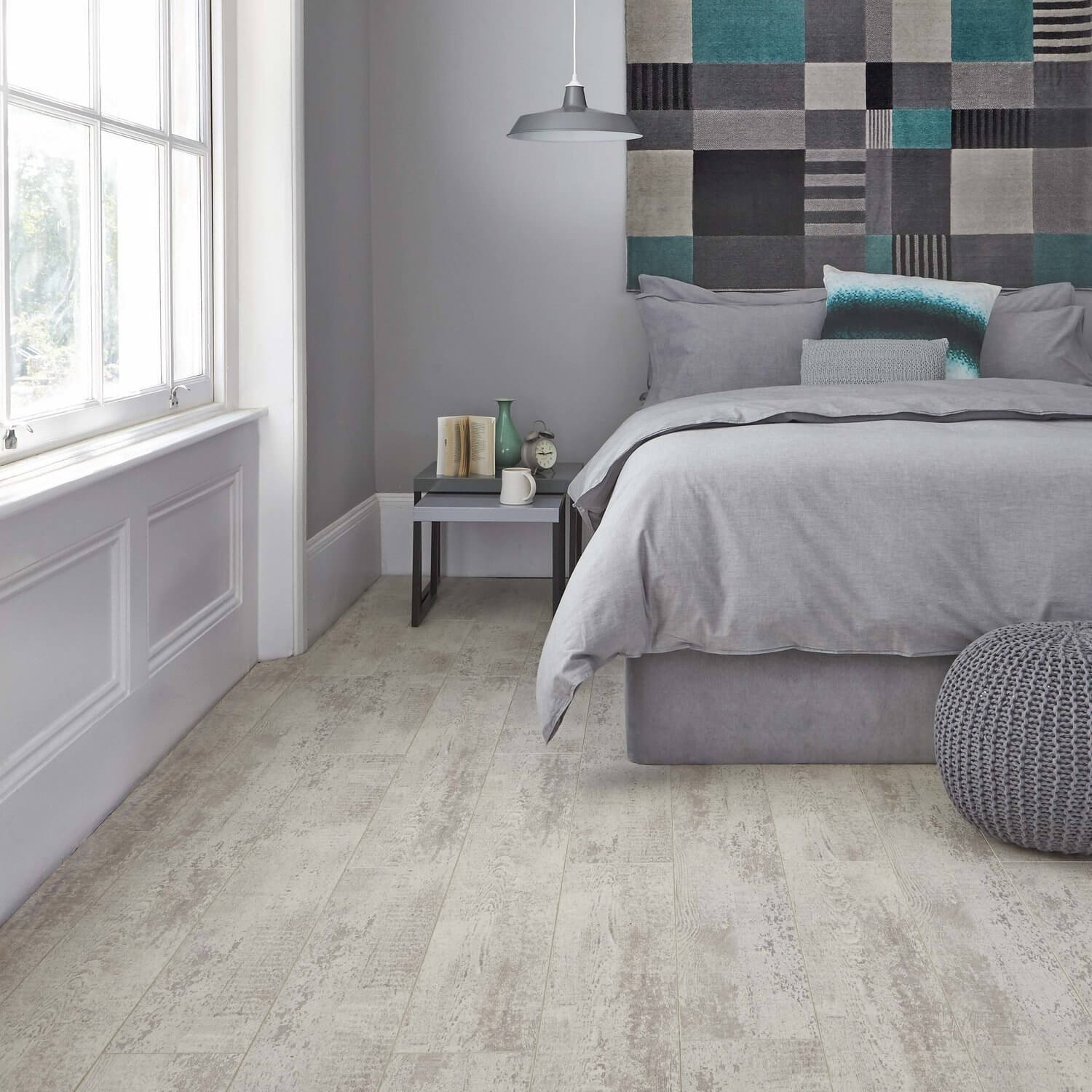Your bedroom floor isn’t just about looks—it sets the tone for comfort, sleep quality, and even your home’s value. Bedrooms are sanctuaries for rest and relaxation, making flooring a critical element that influences both comfort and design. Forget high-traffic worries, the best bedroom flooring prioritizes bare feet bliss and aesthetic harmony.
So, you’re on the hunt for the perfect bedroom flooring—that’s fantastic! But with so many options available, how do you choose the one that will transform your bedroom into the peaceful retreat you deserve?
Don’t worry, we’ve got you covered! In this comprehensive guide, we’ll explore the best bedroom flooring options, weighing the pros and cons of each to help you make an informed decision.
Why Your Bedroom Flooring Matters
While some might consider bedroom flooring an afterthought, it plays a crucial role in setting the overall ambiance and comfort of your personal haven. Unlike high-traffic areas like living rooms and hallways, bedrooms offer a unique opportunity to prioritize comfort and design preferences over extreme durability.
Here’s why your bedroom flooring deserves careful consideration:
-
Comfort Underfoot: Imagine stepping out of bed onto a cold, hard floor—not exactly the most inviting way to start your day, right? The right flooring can make a world of difference in how comfortable your bedroom feels, especially when you’re padding around barefoot.
-
Sound Insulation: Bedrooms should be oases of calm and tranquility, and flooring can play a significant role in minimizing noise. Whether it’s muffling the sound of footsteps or reducing echoes, choosing flooring with sound-dampening qualities can enhance relaxation and sleep quality.
-
Style and Aesthetics: Your bedroom should reflect your personal style, and flooring is a major design element that can tie everything together. From plush carpets that exude warmth to sleek hardwood floors that add a touch of sophistication, the options are as diverse as your imagination!
Understanding Your Bedroom Flooring Needs
Before diving into the world of flooring materials, it’s important to consider your specific needs and preferences. Asking yourself a few key questions can help narrow down your choices:
- What’s your budget? Flooring costs can vary widely, so it’s essential to set a realistic budget early on.
- What’s your style? Do you gravitate towards modern minimalism, cozy farmhouse charm, or something in between?
- Do you have allergies or sensitivities? Some flooring materials are more hypoallergenic than others.
- Do you prefer a warm or cool feel underfoot?
- How much noise reduction do you need?
Once you have a better understanding of your priorities, you can start exploring different flooring options with confidence.
Exploring Bedroom Flooring Options: Pros, Cons & Ideal Uses
From the plush comfort of carpet to the timeless elegance of hardwood, let’s delve deeper into the world of bedroom flooring options.
1. Carpet
Ah, carpet—the epitome of comfort and warmth. There’s something undeniably luxurious about sinking your toes into a soft, plush carpet, especially on chilly mornings. Carpet is an excellent choice for bedrooms, offering a range of benefits:
Pros:
* Unmatched Comfort: Carpet provides a soft, cushioned surface that’s gentle on your feet and joints.
* Warmth and Insulation: Carpet acts as a natural insulator, keeping your bedroom warmer in the winter and reducing energy costs.
* Sound Absorption: Carpet excels at muffling sound, making it an excellent choice for bedrooms where noise reduction is a priority.
* Budget-Friendly: Carpet is generally less expensive to install than many other flooring options, making it an attractive choice for budget-conscious homeowners.
* Style Versatility: Carpet comes in a vast array of colors, patterns, textures, and pile heights, allowing you to find the perfect match for your bedroom’s aesthetic.
Cons:
* Stains and Allergens: Carpet can be more susceptible to stains than other flooring types, and it can trap dust, pet dander, and allergens, which might be a concern for those with allergies or sensitivities.
* Maintenance: Carpet requires regular vacuuming and occasional deep cleaning to keep it looking its best and prevent the buildup of dust and allergens.
Ideal For:
Bedrooms where comfort, warmth, and sound insulation are top priorities. Carpet is a popular choice for bedrooms, nurseries, and playrooms.
2. Hardwood Flooring
Hardwood flooring is a classic choice that exudes timeless elegance and sophistication. It’s a durable and long-lasting flooring option that can increase your home’s value.
Pros:
* Durability and Longevity: Hardwood floors can withstand years of wear and tear, making them a worthwhile investment.
Timeless Appeal: Hardwood flooring never goes out of style and complements a wide range of design aesthetics, from traditional to contemporary.
* Easy to Clean and Maintain: Hardwood floors are relatively easy to clean and maintain with regular sweeping or vacuuming and occasional mopping.
* Hypoallergenic: Hardwood floors don’t trap dust and allergens as readily as carpet, making them a healthier choice for people with allergies.
* Increased Home Value:* Hardwood flooring is a sought-after feature that can increase your home’s resale value.
Cons:
* Cost: Hardwood flooring can be more expensive to install than other flooring options, but its durability and longevity often offset the initial cost.
* Noise: Hardwood floors can be noisy to walk on, especially with shoes. Area rugs and sound-dampening underlayment can help mitigate this issue.
* Susceptibility to Scratches: While durable, hardwood flooring can be susceptible to scratches and dents, especially from pet claws or heavy furniture.
Ideal For:
Bedrooms where timeless elegance, durability, and a touch of sophistication are desired. Hardwood flooring is a classic choice for master bedrooms, guest rooms, and home offices.
3. Engineered Wood Flooring
Engineered wood flooring offers the beauty of hardwood with enhanced stability and moisture resistance, making it an excellent choice for bedrooms prone to humidity fluctuations.
Pros:
* Stability: Engineered wood flooring is less likely to warp or buckle due to changes in humidity compared to solid hardwood.
* Moisture Resistance: It’s a more moisture-resistant option than solid hardwood, making it suitable for bedrooms in humid climates or basements.
Affordability: Engineered wood flooring can be more affordable than solid hardwood, depending on the wood species and thickness of the veneer layer.
* Easy Installation:* Many engineered wood flooring options come with click-and-lock installation systems, making them DIY-friendly.
Cons:
* Limited Lifespan: While durable, engineered wood flooring may not last as long as solid hardwood because it has a thinner veneer layer.
* Refinishing Limitations: The veneer layer of engineered wood flooring can only be refinished a limited number of times.
Ideal For:
Bedrooms in humid climates, basements, or areas where moisture might be a concern. It’s also a good choice for homeowners seeking the look of hardwood flooring at a more affordable price point.
4. Laminate Flooring
Laminate flooring has gained popularity in recent years as a durable, affordable, and stylish alternative to hardwood flooring. It’s a versatile option that comes in a wide range of styles to complement any bedroom decor.
Pros:
* Affordability: Laminate flooring is one of the most budget-friendly flooring options available, making it a popular choice for homeowners looking to renovate on a budget.
* Durability and Scratch Resistance: Laminate flooring is highly durable and resistant to scratches, dents, and stains, making it a great choice for bedrooms with children or pets.
* Easy to Clean and Maintain: Laminate floors are incredibly easy to clean and maintain, requiring only regular sweeping or vacuuming and occasional mopping.
* Wide Range of Styles: Laminate flooring comes in a wide range of styles, colors, and patterns, mimicking the look of hardwood, tile, and even stone.
Cons:
* Moisture Sensitivity: While more resistant to moisture than some flooring options, laminate flooring can be damaged by excessive moisture. It’s essential to wipe up spills promptly and avoid using it in areas prone to frequent water exposure.
* Can Be Noisy: Laminate flooring can be noisy underfoot, especially without proper underlayment.
* Less Authentic Look and Feel: While laminate flooring can convincingly mimic the look of natural materials, it doesn’t have the same authentic feel underfoot.
Ideal For:
Bedrooms where durability, affordability, and ease of maintenance are top priorities. Laminate flooring is ideal for children’s bedrooms, guest rooms, and rental properties.
5. Vinyl Flooring
Vinyl flooring has come a long way from its humble beginnings. Today’s vinyl flooring options offer exceptional durability, water resistance, and style versatility, making it a top contender for bedroom flooring.
Pros:
* Exceptional Water Resistance: Vinyl flooring is highly water-resistant, making it an excellent choice for bedrooms prone to spills or moisture, such as children’s rooms or basements.
* Durability: Vinyl flooring is incredibly durable and can withstand heavy foot traffic, scratches, and dents, making it suitable for active households.
* Easy Maintenance: Vinyl floors are a breeze to clean and maintain, requiring only regular sweeping or mopping.
* Affordability: Vinyl flooring is a budget-friendly option that offers exceptional value for its durability and performance.
* Style Versatility: Modern vinyl flooring comes in a wide array of styles, colors, and patterns, including realistic wood-look planks, tiles, and even stone patterns.
Cons:
* Can Fade in Sunlight: Prolonged exposure to direct sunlight can cause some vinyl flooring to fade over time.
* Less Forgiving Underfoot: Vinyl flooring can be less forgiving underfoot compared to carpet or cork, especially without proper underlayment.
Ideal For:
Bedrooms where water resistance, durability, and affordability are top priorities. Vinyl flooring is an excellent choice for children’s bedrooms, basements, bathrooms, and kitchens.
6. Cork Flooring
Cork flooring is an eco-friendly and stylish flooring option that offers a unique blend of comfort, warmth, and sound insulation. It’s a natural material harvested from the bark of cork oak trees, making it a sustainable and renewable resource.
Pros:
* Eco-Friendly: Cork is a natural, renewable, and biodegradable material, making it an environmentally friendly flooring choice.
* Comfort and Warmth: Cork flooring has a naturally warm and slightly spongy feel underfoot, providing a comfortable surface to walk on.
* Sound Insulation: Cork’s natural cellular structure makes it an excellent sound absorber, reducing noise levels and creating a quieter bedroom environment.
* Hypoallergenic: Cork is naturally resistant to mold, mildew, and allergens, making it a healthy choice for bedrooms, especially for those with allergies or sensitivities.
Cons:
* Susceptibility to Scratches and Dents: While durable, cork flooring can be susceptible to scratches and dents from furniture legs, pet claws, or sharp objects.
* Fading: Prolonged exposure to direct sunlight can cause cork flooring to fade over time.
* Limited Design Options: While cork flooring comes in a growing range of colors and patterns, it may not offer the same vast selection as other flooring types.
Ideal For:
Bedrooms where eco-friendliness, comfort, warmth, and sound insulation are highly valued. Cork flooring is also a popular choice for children’s bedrooms, home offices, and studios.
7. Tile Flooring
While not as common in bedrooms as other flooring types, tile can be an excellent choice for warmer climates or for homeowners seeking a durable, water-resistant, and stylish flooring option.
Pros:
* Exceptional Durability: Tile flooring is incredibly durable and can withstand heavy foot traffic, scratches, and dents. It’s virtually indestructible with proper care.
* Water Resistance: Tile flooring is impervious to water damage, making it an ideal choice for bedrooms in humid climates or those prone to spills.
* Easy to Clean and Maintain: Tile floors are incredibly easy to clean and maintain with regular sweeping or mopping.
* Style Versatility: Tile flooring comes in a vast array of colors, patterns, sizes, and materials, including ceramic, porcelain, and natural stone, offering endless design possibilities.
Cons:
* Hardness and Coldness: Tile flooring is a hard surface that can be cold underfoot, especially during colder months. Area rugs and underfloor heating can help mitigate this issue.
* Noise: Tile floors can be noisy to walk on, especially without proper underlayment.
* Installation: Tile installation can be more complex and time-consuming than other flooring types, often requiring professional installation.
Ideal For:
Bedrooms in warmer climates or homes with a Mediterranean or contemporary design aesthetic. Tile flooring is also a popular choice for bathrooms, kitchens, and entryways.
What the Experts Say
“When choosing bedroom flooring, comfort and style should be your top priorities,” says [Quote from a reputable interior designer or flooring expert]. “Don’t be afraid to choose a flooring material that feels good underfoot and complements your personal aesthetic.”
Making the Final Decision: Choosing the Best Bedroom Flooring for You
Ultimately, the “best” bedroom flooring is the one that best meets your individual needs, preferences, and lifestyle.
Here’s a quick recap of the key factors to consider:
- Budget: Set a realistic budget and explore flooring options within your price range.
- Lifestyle: Consider your lifestyle factors, such as allergies, pets, and daily habits.
- Style: Choose flooring that complements your bedroom’s overall design aesthetic.
- Comfort: Prioritize comfort and warmth underfoot, especially if you live in a colder climate.
- Durability: Assess your needs for durability, especially if you have children or pets.
- Maintenance: Consider your willingness to maintain your flooring, including regular cleaning and potential repairs.
Pro Tip: Order samples of your top flooring choices and see how they look and feel in your actual bedroom with its lighting conditions.
Conclusion: Create Your Dream Bedroom Retreat
Choosing the right bedroom flooring is an investment in your comfort and well-being. By carefully considering your needs, preferences, and lifestyle, you can transform your bedroom into a serene and stylish sanctuary you’ll love coming home to.
- Grass Forever in Livermore: Your Guide to Artificial Turf - April 22, 2025
- German Roaches vs. American Roaches: Key Differences and Control - April 22, 2025
- 150+ Flowers That Start With S: A Comprehensive Guide - April 22, 2025










